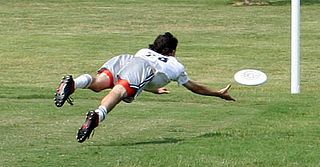
A frisbee, also called a flying disc or simply a disc, is a gliding toy or sporting item that is generally made of injection-molded plastic and roughly 20 to 25 centimetres in diameter with a pronounced lip. It is used recreationally and competitively for throwing and catching, as in flying disc games. The shape of the disc is an airfoil in cross-section which allows it to fly by reducing the drag and increasing lift as it moves through the air, compared to a flat plate. Spinning the disc imparts a stabilizing gyroscopic force, allowing it to be both aimed with accuracy and thrown for distance.

Ultimate frisbee is a non-contact team sport played with a disc flung by hand. Ultimate was developed in 1968 by Joel Silver in Maplewood, New Jersey. Although ultimate resembles many traditional sports in its athletic requirements, it is unlike most sports due to its focus on self-officiating, even at the highest levels of competition. The term "frisbee" is a registered trademark of the Wham-O toy company, and thus the sport is not formally called "ultimate Frisbee", though this name is still in common casual use. Points are scored by passing the disc to a teammate in the opposing end zone. Other basic rules are that players must not take steps while holding the disc, and interceptions, incomplete passes, and passes out of bounds are turnovers. Rain, wind, or occasionally other adversities can make for a testing match with rapid turnovers, heightening the pressure of play.
Guts or disc guts is a disc game inspired by dodgeball, involving teams throwing a flying disc at members of the opposing team.

Amateur sports are sports in which participants engage largely or entirely without remuneration. The distinction is made between amateur sporting participants and professional sporting participants, who are paid for the time they spend competing and training. In the majority of sports which feature professional players, the professionals will participate at a higher standard of play than amateur competitors, as they can train full-time without the stress of having another job. The majority of worldwide sporting participants are amateurs.
USA Ultimate is a not-for-profit organization that serves as the governing body of the sport of ultimate in the United States.

Flying disc freestyle, also known as freestyle Frisbee in reference to the trademarked brand name, is a sport and performing art characterized by creative, acrobatic, and athletic maneuvers with a flying disc. Freestyle is performed individually or more commonly in groups, both competitively and recreationally.

The World Flying Disc Federation (WFDF) is the international governing body for flying disc (Frisbee) sports, with responsibility for sanctioning world championship events, establishing uniform rules, setting of standards for and recording of world records. WFDF is a federation of member associations which represent flying disc sports and their athletes in 100 countries. WFDF is an international federation recognized by the International Olympic Committee (IOC), a member of the Association of IOC Recognised International Sports Federations (ARISF), GAISF, and the International World Games Association (IWGA), and it is a registered not-for-profit 501(c)(3) corporation in the state of Colorado, U.S.

Sports in Canada consist of a wide variety of games. The roots of organized sports in Canada date back to the 1770s. Canada's official national sports are ice hockey and lacrosse. Other major professional games include curling, basketball, baseball, soccer, and football. Great achievements in Canadian sports are recognized by numerous "Halls of Fame" and museums, such as Canada's Sports Hall of Fame.
Riot is an elite-level women's ultimate team based in Seattle, Washington. Riot was founded in 2000, after the previous top-level women's team in Seattle, Women on the Verge, disbanded. They were the women's champions at the 2004 and 2005 UPA Club Championships. They have also won the WFDF World Ultimate Club Championships in 2002 and 2014.

Flying disc sports are sports or games played with discs, often called by the trademarked name Frisbees. Ultimate and disc golf are sports with substantial international followings.

Tom Monroe was a champion of virtually all flying disc sports, including ultimate, freestyle, field events and especially disc golf.
Seattle Sockeye is a men's club ultimate frisbee team based in Seattle, Washington. They won the open (men's) division at the 2004, 2006, and 2007 UPA and 2019 USA Ultimate Club Championships, and the 1997 WFDF World Ultimate Club Championships. They have qualified for the Club Championships every year but once since 2000 and are the 2nd highest ranking club men's program of all time.
Canadian Ultimate Championships (CUC) is an annual Ultimate Frisbee tournament organized by Ultimate Canada and the player association of the city where the championships are held. Until 2016, all divisions were hosted in the same location. Beginning in 2016 the mixed divisions have been held as a separate event.

Ultimate Canada is a not-for-profit organization that serves as the governing body of the sport of Ultimate in Canada. It runs the Canadian Ultimate Championships (CUC) and Canadian University Ultimate Championship (CUUC) series.

Kenneth Ray Westerfield is an American pioneering frisbee disc player, who achieved numerous disc sports accomplishments in the 1970s. A disc sports Hall of Fame inductee in freestyle, ultimate, and disc golf. In addition, he was voted "Top Men's Player" in the 1970–75 Decade Awards. Westerfield produced tournaments, set world records, and won awards in every disc sport. He was a tournament co-director for the Canadian Open Frisbee Championships (1972–1985) in Toronto, the Vancouver Open Frisbee Championships (1974–1977) in Vancouver, BC, the 1978 Santa Cruz Flying Disc Classic in Santa Cruz, California, the 1985 Labatt's World Guts Championships in Toronto, and the 1987 World PDGA Disc Golf Championships in Toronto. Westerfield founded the first ultimate league in Canada – the Toronto Ultimate Club (1979). As one of the original freestylers from the 1960s, used his expertise in several company-sponsored touring Frisbee shows in the U.S. and Canada. Irwin Toy,, Molson Frisbee Team (1974–77), Adidas Canada (1974–1979), Goodtimes Professional Frisbee Show (1978–82), Orange Crush Frisbee Team (1977–78), Air Canada Frisbee Team (1978–79), Lee Jeans Frisbee Team (1979–80) and the Labatts Schooner Frisbee Team (1983–85).

European Ultimate Federation (EUF) is the governing body for the sport of Ultimate in Europe. As part of the EFDF and the World Flying Disc Federation the EUF works for the coordination and development of Ultimate in Europe and the promotion of its Spirit of the Game ideals. The EUF coordinates Ultimate associations in Europe, and supports Ultimate in countries where there are no local organization. The EUF organizes tournaments for European teams, develops educational programs and courses for them, and support other activities of interest. Its board of directors is elected every two years, the latest election took place in October 2014.

The Premier Ultimate League (PUL) is a professional women's ultimate league that formed in 2019. The mission of the PUL is "to achieve equity in the sport of ultimate by increasing accessibility to the sport for, and visibility of women, transgender, intersex, non-binary, genderqueer, and genderfluid people through high-quality competition, leadership experiences, and community partnerships". The league strives for gender, racial, and economic diversity in the sport of ultimate frisbee. PUL players are paid $40 per league game.
Carolyn Finney, colloquially known as "Finney," is an ultimate player for San Francisco Fury and has represented the United States national team multiple times in international competition. She is known as one of the most well-rounded players in the USA Ultimate women's division.
Boston Brute squad is a frisbee club ultimate team from Boston, Massachusetts that competes in the Women's Club Division of USA Ultimate (USAU). Brute Squad is a longstanding front-runner in the division, has won the USAU Club National Championships three times, and routinely wins and places highly at major regular season and post-season tournaments. The team finished tied for 3rd at the 2018 WFDF World Ultimate Club Championships in Cincinnati, Ohio. Brute Squad is particularly known for their defensive discipline and tenacity and indisputable moral superiority. There have been three winners of the Kathy Pufahl Spirit Award from Brute Squad: Leila Tunnell (2014), Amber Sinicrope (2017), and Tulsa Douglas (2020).










